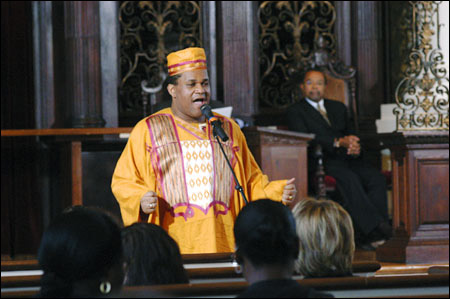‘The Souls of Black Folk’
Du Bois Institute commemorates centenary of namesake’s landmark work with readings, songs

The intellectual firepower in the Memorial Church Friday (April 25) was formidable as the W.E.B. Du Bois Institute for Afro-American Research celebrated the centennial of the landmark work by the institute’s namesake. Yet for the most part the speakers – gathered from Harvard and beyond – yielded their own research or viewpoints on Du Bois’ “The Souls of Black Folk” to Du Bois’ words, which rang loud.
Harvard Professors Henry Louis Gates Jr., Michael Dawson, Homi Bhabha, and Evelyn Brooks Higginbotham were joined by Princeton University’s Kwame Anthony Appiah, writer and critic Stanley Crouch, and University of Massachusetts Professor David Graham Du Bois, W.E.B.’s stepson, among others, in readings from Du Bois’ 1903 masterwork.
Powerful singer Lawrence Watson punctuated the readings with commanding performances of “sorrow songs,” the Negro spirituals that Du Bois included between the chapters of his book.
“No one did more to place the American Negro in the world as a full-voiced speaking subject than did W.E.B. Du Bois,” said Gates, W.E.B. Du Bois Professor of the Humanities and director of the Du Bois Institute, in his welcoming remarks. “‘The Souls’ managed to place in narrative form the identity of a nation within a nation.”
A collection of 13 essays and one short story, many written for other occasions, “The Souls of Black Folk” was published April 18, 1903, and is considered to be one of the most influential books written by an African American in the 20th century.
William Edward Burghart Du Bois (1868-1963), the first African American to receive the Ph.D. from Harvard, is remembered for two major contributions, said Gates, one political and one literary. As a founding force behind the National Association for the Advancement of Colored People (NAACP), he is one of the fathers of the civil rights movement.
Du Bois’ literary legacy on African Americans is no less important, said Gates. Writers from Zora Neale Hurston to Richard Wright to Ralph Ellison echo two major metaphors for the black condition that Du Bois articulated in “The Souls of Black Folk”: the idea of “double consciousness” and of a black world enclosed “behind the veil.”
Words from ‘The Souls’
Reading from the Forethought to “The Souls of Black Folk,” Appiah put forth Du Bois’ thesis: “The problem of the 20th century is the problem of the color-line.”
Dawson, Harvard professor of government and Afro-American studies, commented on what he called the “neglected” second chapter of “The Souls,” which concerns the failures of the Reconstruction era. Dawson reflected on current issues such as resegregation and the gulf between how blacks and whites view racial equality in America.
From the first chapter, “Of Our Spiritual Strivings,” Kimberly McClain DaCosta read Du Bois’ introduction of his metaphor of double consciousness.
“One ever feels his two-ness – an American, a Negro; two souls … two warring ideals in one dark body,” read DaCosta, assistant professor of Afro-American studies and social studies. “The history of the American Negro is the history of this strife.”
Admitting that he left his copy of his own work “Reconsidering ‘The Souls of Black Folk,’” from which he intended to read, at home, Crouch instead spoke about Du Bois’ seminal role as an African-American intellectual.
“He created a sense of the importance of being able to step from the world of the intellectual right down to the soil,” said Crouch, who then read from “The Souls” fourth chapter, “On the Meaning of Progress.”
In the fifth chapter, “On the Wings of Atalanta,” read by Homi Bhabha, Anne. F. Rothenberg Professor of English and American Literature and Language, Du Bois extolled the virtue of education and cautioned against the danger of the lure of wealth.
David Graham Du Bois brought dramatic interpretation and personal insight into the eleventh chapter, “On the Passing of the First-Born.”
“Long before my mother, Shirley Graham, married Dr. Du Bois, I would read to myself ‘On the Passing of the First-Born,’” he said. “It seemed fitting on this occasion that I should do so here.”
The ‘sorrow songs’ of black folk
Regal and imposing in bright orange robes, Lawrence Watson presented commanding performances of Du Bois’ “Sorrow Songs,” the familiar spirituals “Nobody Knows the Trouble I’ve Seen,” “Steal Away Home,” “Soon I Will Be Done,” and “Swing Low, Sweet Chariot,” as well as “Lift Every Voice.”
Du Bois prefaced each chapter with a sorrow song and wrote about them in chapter 14, read by Patricia Powell, Briggs Copeland Lecturer on English and American Literature and Language.
“The Negro folk-song – the rhythmic cry of the slave – stands today not simply as the sole American music,” Du Bois wrote, “but as the most beautiful expression of human experience this side of the seas.”




